Foreign owners invade English Premier League

Even in today’s economy you’d think $1.4 billion would be enough to buy love. Or at the very least, indifference.
But that hasn’t been the case with the Glazer family, whose debt-driven purchase of English soccer team Manchester United a decade ago has brought them five Premier League titles, three League Cups, a Champions League crown, a FIFA Club World Cup — and a death threat against Malcolm Glazer, the billionaire patriarch of the family.
As for why that is, start with the fact that the Glazers, who also own the NFL’s Tampa Bay Buccaneers, seem to have little interest in and even less appreciation for the European version of football. Buying Manchester United had nothing to do with passion and everything to do with profit.
That’s merely a faint smoke screen masking the real reason for the fans’ disdain of their absentee owners. In England, Manchester United is more than a soccer team, it’s a national institution, a unique treasure on par with the Magna Carta, the Queen Mother and Monty Python.
So for many, having that treasure in the hands of a shopping center magnate from the colonies is a little like seeing the sun set on the British Empire all over again.
Turns out Manchester United was just the start, though. This season Americans own six of the Premier League’s 20 teams, among them iconic franchises Arsenal, Liverpool and Aston Villa. Now the movement is spreading. Three years ago a group of Boston businessmen, headed by Thomas R. DiBenedetto and current President James Pallotta, brought A.S. Roma, becoming the first foreign owners in Italy’s highest league.
And despite the often negative reaction from supporters, the change has had positive results — even in Manchester, where the Glazers, whom fans tried to force out, have won more trophies than any other Premier League owners since they took over the club.
In Liverpool, owner John Henry, after a rough start, has the team in contention for its first league title in more than two decades. Arsenal is on pace for its third consecutive 21-win season since St. Louis Rams owner Stan Kroenke bought the team. And 87-year-old Roma has a chance to set a franchise record for victories in a season.
On the other end, Aston Villa remains about where it was — in the middle of the EPL table — eight years after former Cleveland Browns owner Randy Lerner took over while Sunderland (British-based equity fund manager Ellis Short) and Fulham (Jacksonville Jaguars owner Shahid Khan) are headed for relegation.
But it’s the chance for success, says former United captain Bryan Robson, that has made English fans more accepting of U.S. owners.
“Fans hate change. You have a tradition and sometimes people stand still,” says Robson, a former English international who is now an ambassador for United. “Fans are now a lot more comfortable with the American owners … because they know that nearly everyone’s been successful and the clubs have gotten better when the American owners have taken over.”
That doesn’t mean there hasn’t been a steep learning curve. Five of the six U.S. owners of EPL teams — who all declined to be interviewed for this story — ran pro sports franchises in this country before buying into the Premier League. And they quickly learned their experiences here didn’t always translate in Europe.
Henry, for example, was an early proponent of statistical analysis in baseball and his belief in sabermetrics helped his Boston Red Sox win three World Series. But when he appointed “Moneyball” disciple Damien Comolli as his director of football shortly after buying Liverpool it proved disastrous, with the club going $79 million into the red while equaling its worst finish in league play since 1955.
“It’s different. Even the transfer fees and everything’s different. So it’s not easily done,” Ian Rush, Liverpool’s all-time leader scorer, says of the transition from U.S. professional sports to the EPL. “People try to just come in and run it as they run other things.”
But Rush says Henry, who also co-owns a NASCAR team, “looked at what happens on the football side in England. And he’s worked really hard to do that. He’s learned and he’s got it right.”
One thing shared by the Red Sox and Liverpool’s Reds, Rush says, is a passionate fan base. And Henry knew how to leverage that from the day he bought the soccer team in October 2010.
So while the secretive Glazers are have earned the ire of United fans, who still see them as aloof and dispassionate, Henry won major points with Liverpool supporters when he delivered a moving speech last summer on the 24th anniversary of the Hillsborough massacre. The incident, in which 96 people — most of them Liverpool supporters — were killed, is remembered as the darkest day in club history.
On the field, Henry hired Brendan Rodgers as coach and now Liverpool is in position to win its first title of the Premier League era. That too has earned him goodwill from the fans.
“It’s like everything. If you’re successful, you’ll be fine,” Rush says. “Man United has had fantastic success. And Liverpool is looking to emulate them. If you’re successful doing that, it doesn’t matter what nationality you are.”
Twitter: @kbaxter11







